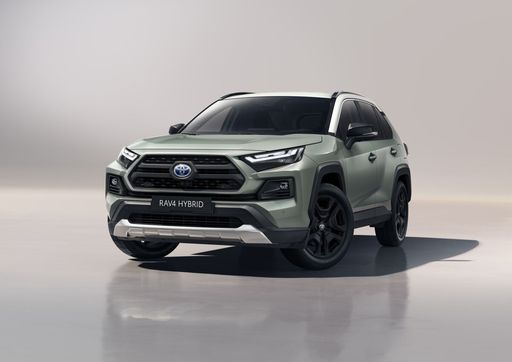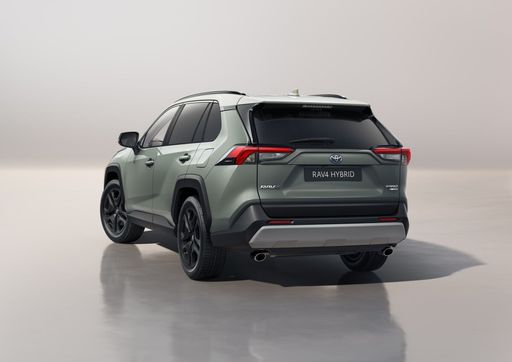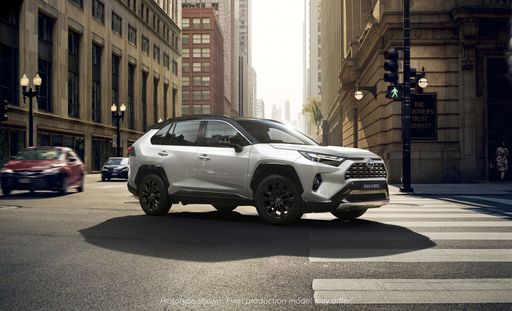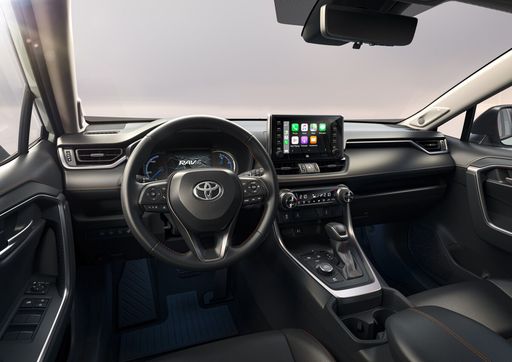Hyundai i20 vs Toyota RAV4 - Differences and prices compared
Costs and Efficiency:
Looking at overall running costs, both models reveal some interesting differences in everyday economy.
Hyundai i20 has a convincingly advantage in terms of price – it starts at 17400 £, while the Toyota RAV4 costs 35100 £. That’s a price difference of around 17734 £.
Fuel consumption also shows a difference: Toyota RAV4 manages with 1 L and is therefore convincingly more efficient than the Hyundai i20 with 5.20 L. The difference is about 4.20 L per 100 km.
Engine and Performance:
Power, torque and acceleration are the classic benchmarks for car enthusiasts – and here, some clear differences start to show.
When it comes to engine power, the Toyota RAV4 has a convincingly edge – offering 306 HP compared to 100 HP. That’s roughly 206 HP more horsepower.
In acceleration from 0 to 100 km/h, the Toyota RAV4 is significantly quicker – completing the sprint in 6 s, while the Hyundai i20 takes 11.10 s. That’s about 5.10 s faster.
In terms of top speed, the Hyundai i20 performs minimal better – reaching 183 km/h, while the Toyota RAV4 tops out at 180 km/h. The difference is around 3 km/h.
Space and Everyday Use:
Cabin size, boot volume and payload all play a role in everyday practicality. Here, comfort and flexibility make the difference.
Seats: offers more seating capacity – vs .
In curb weight, Hyundai i20 is clearly lighter – 1088 kg compared to 1745 kg. The difference is around 657 kg.
In terms of boot space, the Toyota RAV4 offers noticeable more room – 580 L compared to 352 L. That’s a difference of about 228 L.
In maximum load capacity, the Toyota RAV4 performs distinct better – up to 1690 L, which is about 525 L more than the Hyundai i20.
When it comes to payload, Toyota RAV4 noticeable takes the win – 600 kg compared to 472 kg. That’s a difference of about 128 kg.
Who wins the race?
The Toyota RAV4 proves to be is largely superior and therefore becomes our DriveDuel Champion!
Toyota RAV4 is the better all-rounder in this comparison.
 @ Toyota Motor Corporation
@ Toyota Motor Corporation
Toyota RAV4
Costs and Consumption
View detailed analysis
Engine and Performance
View detailed analysis
Dimensions and Body
View detailed analysis
Hyundai i20
The Hyundai i20 is a cheeky small car that mixes smart styling with sensible practicality, feeling more polished and roomy than you might expect for the money. It’s an easy car to live with, offering engaging handling, a comfy cabin and useful equipment that make daily commutes and weekend errands notably less dull.
details @ Hyundai Motor Company
@ Hyundai Motor Company
 @ Hyundai Motor Company
@ Hyundai Motor Company
 @ Hyundai Motor Company
@ Hyundai Motor Company
 @ Hyundai Motor Company
@ Hyundai Motor Company
 @ Hyundai Motor Company
@ Hyundai Motor Company
Toyota RAV4
The Toyota RAV4 feels like a sensible friend on the road, marrying dependable practicality with a dash of SUV personality that keeps daily driving from turning dull. Comfortable and easy to live with, it looks tough without shouting and quietly gets the job done — a sensible pick for buyers who want versatility without drama.
details @ Toyota Motor Corporation
@ Toyota Motor Corporation
 @ Toyota Motor Corporation
@ Toyota Motor Corporation
 @ Toyota Motor Corporation
@ Toyota Motor Corporation
 @ Toyota Motor Corporation
@ Toyota Motor Corporation
 @ Hyundai Motor Company
@ Hyundai Motor Company
|
 @ Toyota Motor Corporation
@ Toyota Motor Corporation
|
|
|
|
Costs and Consumption |
|
|---|---|
|
Price
17400 - 24000 £
|
Price
35100 - 55700 £
|
|
Consumption L/100km
5.2 - 5.3 L
|
Consumption L/100km
1 - 5.6 L
|
|
Consumption kWh/100km
-
|
Consumption kWh/100km
-
|
|
Electric Range
-
|
Electric Range
75 km
|
|
Battery Capacity
-
|
Battery Capacity
-
|
|
co2
119 - 121 g/km
|
co2
22 - 128 g/km
|
|
Fuel tank capacity
40 L
|
Fuel tank capacity
55 L
|
Dimensions and Body |
|
|---|---|
|
Body Type
Hatchback
|
Body Type
SUV
|
|
Seats
5
|
Seats
5
|
|
Doors
5
|
Doors
5
|
|
Curb weight
1088 - 1190 kg
|
Curb weight
1745 - 1910 kg
|
|
Trunk capacity
352 L
|
Trunk capacity
520 - 580 L
|
|
Length
4065 - 4075 mm
|
Length
4600 mm
|
|
Width
1775 mm
|
Width
1855 mm
|
|
Height
1450 - 1455 mm
|
Height
1685 mm
|
|
Max trunk capacity
1165 L
|
Max trunk capacity
1604 - 1690 L
|
|
Payload
450 - 472 kg
|
Payload
390 - 600 kg
|
Engine and Performance |
|
|---|---|
|
Engine Type
Petrol
|
Engine Type
Full Hybrid, Plugin Hybrid
|
|
Transmission
Automatic, Manuel
|
Transmission
Automatic
|
|
Transmission Detail
Dual-Clutch Automatic, Manual Gearbox
|
Transmission Detail
CVT
|
|
Drive Type
Front-Wheel Drive
|
Drive Type
Front-Wheel Drive, All-Wheel Drive
|
|
Power HP
79 - 100 HP
|
Power HP
218 - 306 HP
|
|
Acceleration 0-100km/h
11.1 - 13.7 s
|
Acceleration 0-100km/h
6 - 8.4 s
|
|
Max Speed
166 - 183 km/h
|
Max Speed
180 km/h
|
|
Torque
113 - 200 Nm
|
Torque
-
|
|
Number of Cylinders
3 - 4
|
Number of Cylinders
4
|
|
Power kW
58 - 74 kW
|
Power kW
160 - 225 kW
|
|
Engine capacity
998 - 1197 cm3
|
Engine capacity
2487 cm3
|
General |
|
|---|---|
|
Model Year
2024
|
Model Year
2024 - 2025
|
|
CO2 Efficiency Class
D
|
CO2 Efficiency Class
D, B
|
|
Brand
Hyundai
|
Brand
Toyota
|
What drivetrain options does the Hyundai i20 have?
The Hyundai i20 is offered with Front-Wheel Drive.
The prices and data displayed are estimates based on German list prices and may vary by country. This information is not legally binding.
